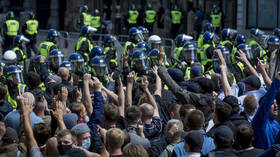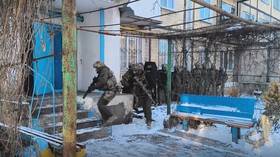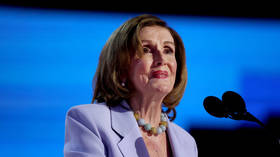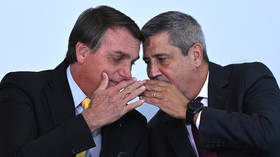Extremism is on the rise in the UK, but history shows new far right group Patriotic Alternative will implode like others before it

With protests on all sorts of issues, political activism is on the increase in the UK. Hope Not Hate has identified a new far right group as a cause for concern, but in reality it’s likely to have little impact.
A new report from campaign group Hope Not Hate puts Patriotic Alternative, a relative newcomer to Britain’s far right scene, under the microscope and worries that there are fresh signs of extremists becoming more organised on the UK political landscape.
While the report explores the growth of the outfit, there hasn’t yet been a quantum leap in membership, as such, although various YouTubers and chatrooms have picked up certain issues.
Also on rt.com Covid-19 lockdown in Britain sparked ‘EXPLOSION’ of ONLINE ANTI-SEMITISM, Jewish charity saysAnd it’s that fragmented support that forms the problem for any group out there which wishes to challenge the organisation on the left, even at the extreme end.
As the authors of the report point out, the organisation is already beset by personality clashes, with the various social media activists falling out over allegations of a “cult-like” organisation, sexual grooming and spying.
Just the sort of infantile stuff you’d expect. That, and the thugs, of course.
The other side is no better, but does things differently. Members of the far left tend to shy away from violence for its own sake. They’re much more interested in the extreme ideas, as considered by Trotsky, Stalin or Mao for instance. While revolution in itself need not be violent, violence is certainly one way of achieving revolution.
And frankly, it’s a fantasy to believe the UK will face an armed socialist revolution. Led by who? Sir Keir Starmer?
But as the woolly sweater brigade smoke their roll-ups and drink herbal tea while discussing the plight of the working man, the far right are drawn to their pole on the political magnet by such a broad range of things they don’t like, it’s hard to find even two people who will agree on what to disagree on.
Is it racial hatred? Anti-semitism? Holocaust denial? All of them? None of them? Something else?
Their existence depends on enough people feeling disenfranchised, forgotten, ignored and just plain angry, but I’m not so sure they are out there in the numbers needed to coagulate into a singular, political force.
This failure to build an organisation on a shared ideology, even if that was based on just one idea - like Brexit for instance - makes it very difficult for a nascent organisation to last the distance.
The high point for the far right in the UK was reached back in October 2009 when then leader of the British National Party, Nick Griffin, was invited on to the BBC’s flagship political panel show, Question Time. Griffin and his BNP colleague Andrew Brons had been elected to the European Parliament that year and there was huge public curiosity about the party.
There was also a lot of controversy about the extremist’s invitation to appear on the BBC show, but here was a chance to see what all the fuss was about just one month after Griffin had first taken his seat as a UK representative in the Brussels hemicycle.
An out-of-shape and out-of-his-depth Griffin sweated buckets under the TV lights and was penned into a corner by an antagonistic audience and the host David Dimbleby as his fellow guests squirmed in their seats, simply because they were sharing his platform. Griffin did not go down well.
After the show, fellow panelist Jack Straw, then Justice Secretary in the Labour government, described the BNP leader as a “fantasising conspiracy theorist with some very unpleasant views and no moral compass.”
And this was the high point.
The BNP’s time in the spotlight did not last. Brons quit the party after his boss allegedly called him “vermin”, and it was wiped out altogether in the 2014 European elections having left no trace on the political landscape, other than the embarrassing fact that 6.2 percent of the British population had once voted for them.
In the ensuing years, no single group has emerged to take the place of the BNP. Some individuals, using strength of personality alone, have tried it but none has succeeded.
Many have attempted to use digital activity to win support. There are hundreds, if not thousands, of far-right websites, forums and social media accounts in the UK, giving lie to the common complaint in politics that the left always have the better tech.
While the young far right are catching up in the IT department, it’s the lack of any real idea, the all-important glue, that is causing the real problem and ensuring the loose collection of people fracture and fall apart.
There have been some individual successes in the online world with respectable YouTube figures, but to really go through the roof on platforms like Twitter and Facebook, the far-right crusaders struggle to keep things polite and are often correctly blocked and banned for overstepping the mark.
Also on rt.com Narrative control tightens as panicked anti-Trump aristocrats crank up media gaslight machinesThe reactionary nature flies in the face of the more tolerant wider society and so they often stumble across the political landscape, their anger at the perceived injustices or conflicting views blinding them to apparent obstacles in front of them: the need to listen, to empathise, to understand why there are opposing ideas.
Hope Not Hate has undertaken an interesting task with its look at Patriotic Alternative. The PA has managed to gain some attention, largely by inflating the success of its stunts on social media, but its members are more interested in themselves and their social media accounts than really joining hands in some supersize right wing party.
We’ve seen it before from their far better-equipped fellow travellers. They’ll flame out at some point, having achieved nothing of significance.
Think your friends would be interested? Share this story!
The statements, views and opinions expressed in this column are solely those of the author and do not necessarily represent those of RT.
















